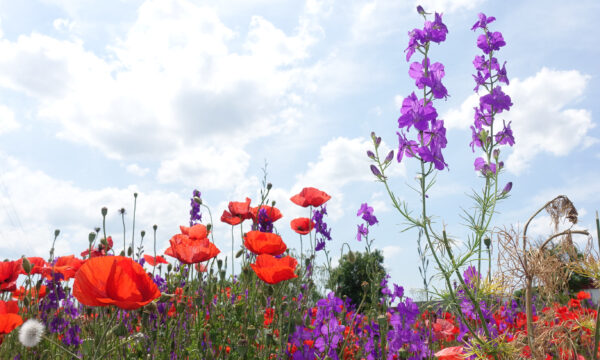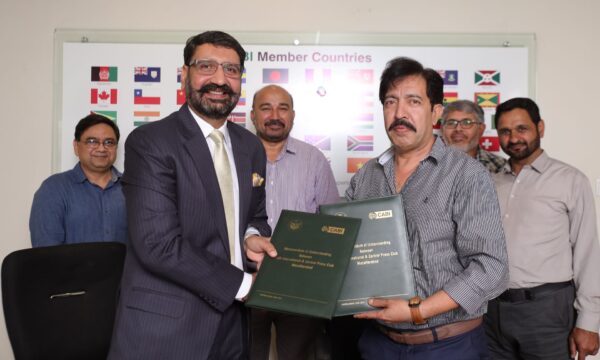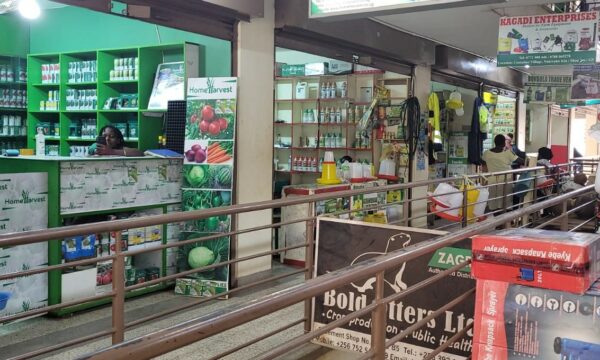This blog was originally uploaded on the CABI BioProtection Portal
Soil is the foundation of agriculture and sustains life on earth by providing nutrients, clean air and water. Human activities can damage soil health and, therefore, impact entire ecosystems. Sustainable farming and gardening practices like biological crop protection and Integrated Pest Management, however, protect and restore soil. These practices foster a resilient soil ecosystem that can maintain its vital functions.
Why is soil health important?
Soil is a complex environment with many crucial components: organic matter, communities of micro-organisms (microbes) and minerals. Healthy soil sustains essential functions such as:
- Water regulation: it stores water and regulates its movement within the soil.
- Support for plant and animal life: soil contributes to the diversity and productivity of living organisms.
- Pollutant filtering: minerals and soil microbes filtrate pollutants, which protects groundwater quality.
- Nutrient cycling: soil and its microbes participate in the storage and cycling of nutrients like phosphorus, nitrogen and carbon, which are essential for plant growth.
- Physical stability and support: soil is a medium for plants that can grow in it, but it is also a support for any human construction.
Healthy soils are vital for the maintenance of these functions. They usually have a rich soil biodiversity, including many different organisms. These organisms include microbes like bacteria and fungi, but also animals such as beneficial insects or worms.

Soil organisms directly contribute to the cycling of nutrients like nitrogen. They can break down organic matter and transform it into nutrients that plants can absorb. They contribute to the cycling of water as well. In other words, soil biodiversity provides us with food and clean water.
Healthy soils are generally more productive and more resilient. They also produce more robust plants that can fight pests and pathogens. Healthy soils can also store more carbon, mitigating climate change.
Unfortunately, soil health is under threat worldwide due to several drivers, such as intensive agriculture, forestry and climate change. For instance, a recent study estimates that 61% of lands in the European Union are affected by soil degradation. Soils in this proportion of land are considered unhealthy.
What is soil degradation?
Many factors influence soil degradation and impact soil health. Some of these are:
- Soil compaction: compacted soil does not have enough space for the movement of air, water and plant roots. Heavy farming machinery and excessive tillage can cause soil compaction.
- Soil erosion: this is the loss of the top layer of soil at a rate faster than it is formed. This layer is the fertile portion of soil and is, therefore, essential for plant growth. Erosion is mainly due to exposure of soil to climatic conditions by leaving it bare from tillage and deforestation.
- Chemical pollution: chemical pesticides, fertilizers and other industrial chemicals can have a negative impact on soil microbes. They decrease the amount and diversity of soil organisms and further harm soil health. They also cause a reduction in soil fertility.

As a result of soil degradation, soil quality gets poorer in nutrients and loses its capacity to hold water. This causes food production to decrease; in the worst cases, degraded soil cannot support plant growth anymore.
The consequences of soil degradation and poor soil health go well beyond the loss of good soil for farming. They affect various aspects of human well-being and the environment. For instance, as degraded soil holds less water, it can decrease the amount of water available for plants and worsen drought. Soil erosion can also increase pollution in streams and water bodies and cause negative effects on water life.
Frequent tillage releases carbon into the atmosphere, contributing to the emissions of greenhouse gases and causing poor health of soil. Overall, this contributes to climate change.
According to the FAO, 33% of global soils are already degraded. In addition, the IPBES states that over 90% of soils could become degraded by 2050.
We must protect soil health at all costs so that soils can sustain their functions, safeguarding the environment and human well-being.
How can we protect soil health?
Agricultural practices to promote soil health
Whilst agriculture is one of the drivers of soil health decline, there are a number of agricultural practices that can reverse the trend and help restore soil health.

Creating good soil health focuses on regenerative agriculture practices, which aim to restore degraded lands. Following these practices, growers can:
- Reduce the use of chemicals: by opting for natural solutions like biocontrol and bioprotection products. These are safer for non-target organisms and can preserve soil biodiversity.
- Read our blog ‘Why use bioprotection in regenerative agriculture‘ to learn how these products can promote soil health.
- Increase the amount of organic matter going back into the fields: this can be done with a cover crop, by leaving crop residues on the soil surface or using organic mulch. Doing so helps the soil microbes to break down organic matter, which is transformed into useful nutrients for plants. It also keeps soil moisture and slows down erosion.
- Reduce soil compaction from machinery and livestock: for example, through minimum or zero tillage and pasture management, such as avoiding over-grazing. These minimize soil disturbance, which helps build back soil health.
- Rotate crops: this increases diversity above and within the soil and breaks the cycle of pests and diseases. Legumes are good crops for rotation as they increase nitrogen in the soil.
- Learn more about regenerative agriculture and its benefits in our blog ‘Regenerative agriculture: an approach to tackle food security issues.’
Other ways to improve soil health in a farming system are:
- Managing water: planting vegetation such as trees and shrubs can help increase the infiltration of water into the soil. Other techniques, like mulching, help save water and prevent soil erosion.
- Managing nutrients: carefully planning and applying manure and fertilizers helps minimize nutrient excesses.
- Integrated Pest Management: this approach to managing pests limits unwanted effects on the environment, including soil.
- Read more about IPM in our blog ‘Integrated Pest Management: how it works and benefits‘

How to improve soil health for gardening
You can even promote soil health at home in your own garden by:
- Creating your compost: from food waste or grass clipping, for instance. In doing so, you can avoid using chemical fertilizers.
- Mulching: this increases the soil organic matter and promotes the activity of soil microbes.
- Using bioprotection: use environmentally-friendly products to protect your garden from pests and diseases.
In caring for our gardens and farms, looking after soil health is key. Using environmentally and soil-friendly practices can keep soil resilient and full of beneficial organisms. Protecting soil helps ensure we can produce enough food and create a healthier environment.
2 Comments
Leave a Reply
Related News & Blogs
The role of soil health in sustainable agriculture
Previously, we have discussed the importance of soil health for agriculture, highlighting its threats and outlining protection strategies. In this blog, we dig deeper into the role of soil health in sustainable agriculture and explore its long-term ben…
18 June 2025





Dear and appreciated Fanny Deiss, I congratulate you for such an important article. The percentage numbers that you write down in Europe and the entire world according to FAO are very alarming. You will see that in Costa Rica we are experiencing a critical situation with coffee cultivation mainly, but vegetables do not escape. Yields have declined enormously, as have international prices. Producing food is not cheap for our producers, and this situation is causing many to give up this activity. Hence our commitment as professionals to reverse this situation. I quickly tell you that in Costa Rica and specifically in San Ramón de Alajuela, where I live, we have a plant clinic, in which we have proposed to focus on soil management, taking into account everything you point out. We have had very good results in the farms where we have a presence, but we are insufficient, since in Costa Rica we have about 200 thousand agricultural producers, but we are going there little by little. I am very interested in all the information you have regarding regenerative agriculture and I would appreciate it if you could send me any information.
My email address is: orozco_juanvice@hotmail.com
I am in charge of the CREQUI-STIHL plant clinic, in San Ramón, Alajuela, Costa Rica.
May you be very well.
Dear Juan Vicente Orozco Delgado,
Thank you for your message and for sharing the critical situation faced by agricultural producers in Costa Rica.
I sincerely appreciate your dedication to helping growers and your enquiry about regenerative agriculture. I’ll be in touch with you shortly via email, sending over relevant information that could interest you.
Best regards,
Fanny Deiss